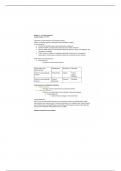Class notes
PSY 101 Consciousness Notes
- Course
- Psychology 101
- Institution
- Virginia Commonwealth University
This is a comprehensive and detailed note on Consciousness for Psy 101. *Essential Study Material!! *For you, at a price that's fair enough!!
[Show more]



